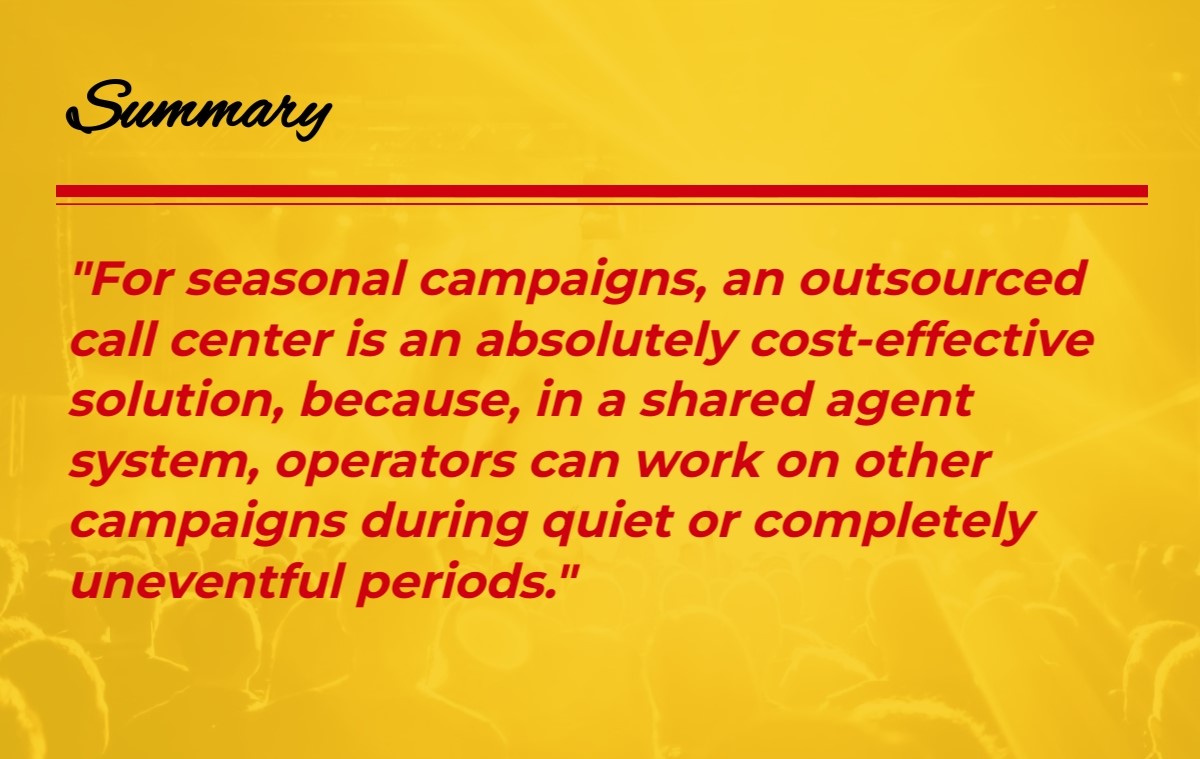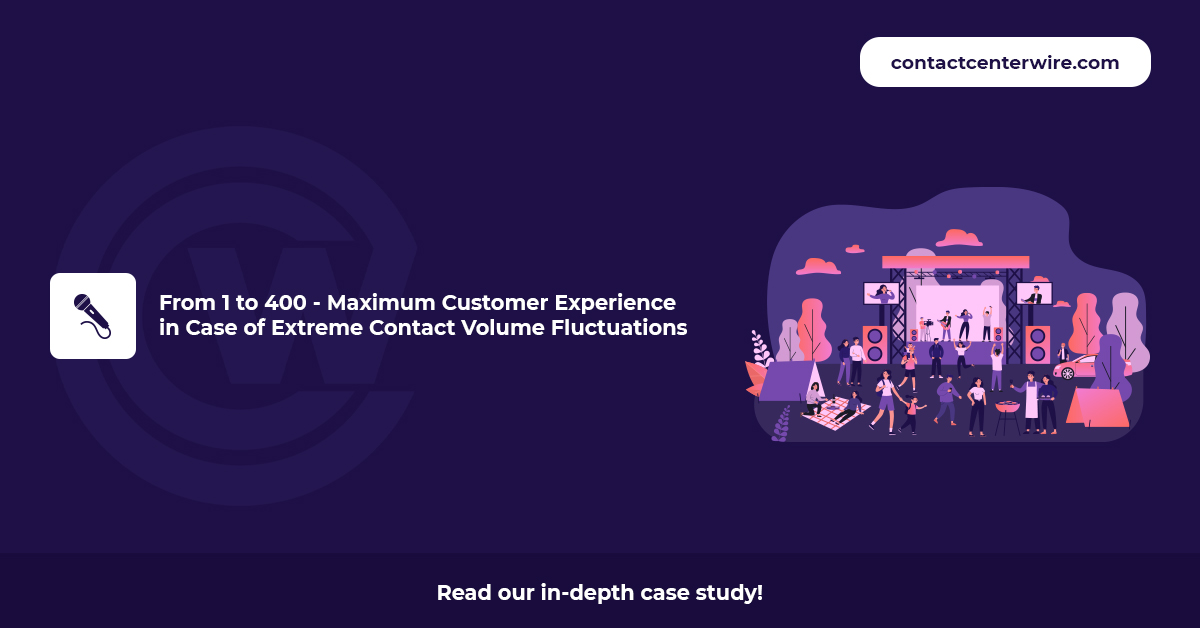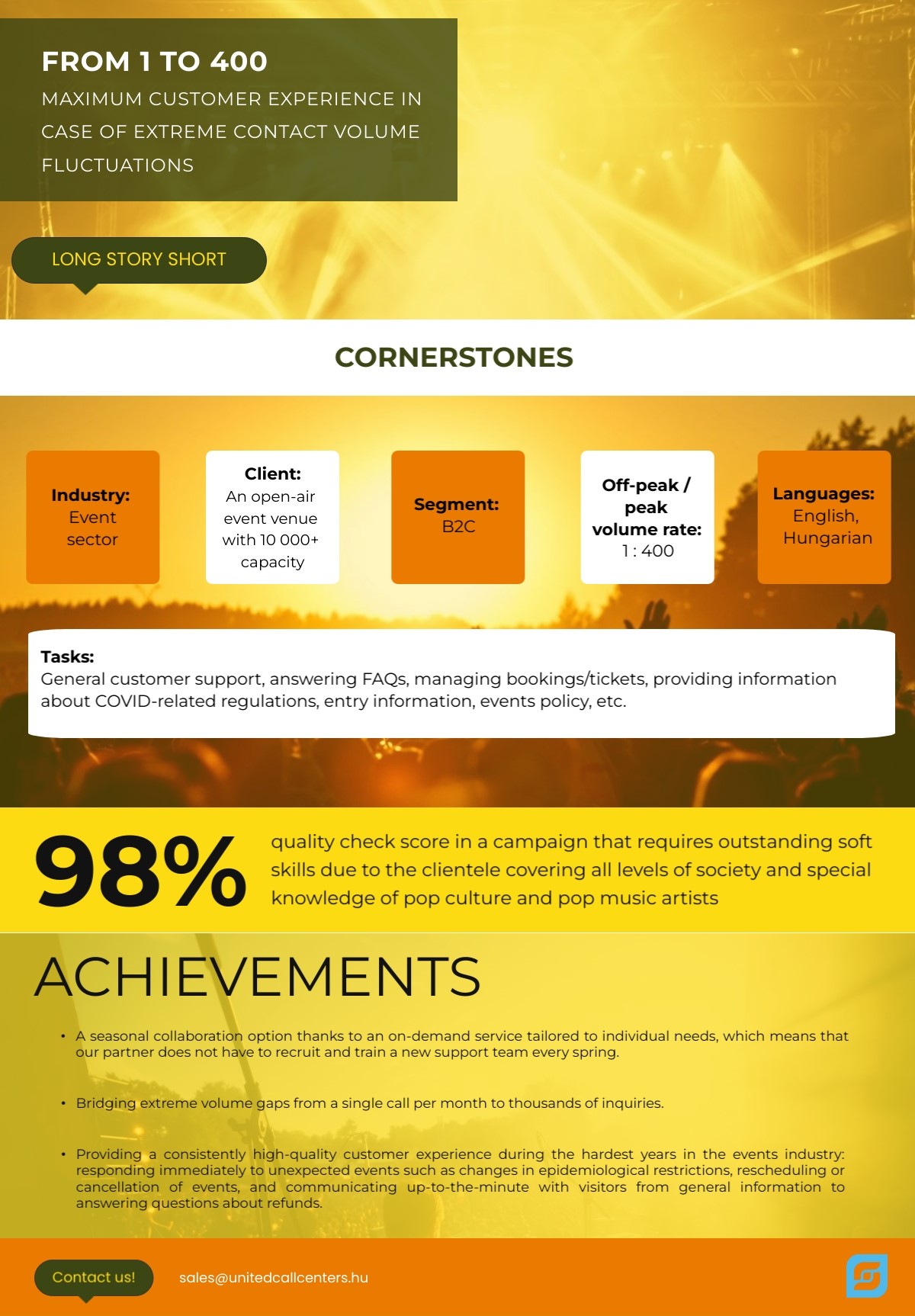With spring approaching, the topic is more than actual, so today's case study looks at a collaboration that is unique in many ways. Keywords: extreme differences between quiet and peak periods, the need for a consistently professional service, the team needed to deliver it, and the contradictions between seasonal operation, shared model, and on-demand services. Get ready for a deeper dive!
Subjects of the article:
- What does a business gain when it chooses to outsource?
- Why is it difficult to set up your own customer service team in an area where the number of contacts fluctuates not only seasonally, but also on a daily basis during the active period?
- What is a win-win-win situation?
- What specific knowledge and skills are required to provide the maximum customer experience for visitors to an entertainment venue?
- What is the most obvious sign of success in such a campaign?
Foreword
Life is simple. Even the most seemingly complicated things can be traced back to very easily understood motivations and laws. If we simplify this logic to the extreme, the most important reason for outsourcing any task from a business point of view is money. More elegantly put, cost-efficiency. The better the customer experience, the stronger the brand; the stronger the brand, the more sales; the more sales, the better the position in the market. Those who focus their efforts so that they have more energy and creative energy for their own tasks are more likely to find original ideas than those who get sucked into micro-management and get lost in tasks that others can do.
"Pull to push!"
Outsourcing customer service costs money. At first glance, it costs a lot. We pay to save money in the long run. By martial arts analogy, we pull to push: we deflect a force in a certain direction to gain an advantage. Cost-effective, focused operations are an advantage. Time, energy, thought. We save the time and skills of the people who do the tasks that do not necessarily create value but are necessary, and the cost of an up-to-date infrastructure that can serve them, and which is constantly being improved.
Anyone who has ever thought about looking for an external contact center has probably come across the increasingly familiar buzzword: on-demand service. But what exactly does this mean? In today's case study, which was prepared with the help of United Call Centers, we explore this question.
The challenges of seasonality
It's spring, and until the end of February, we thought that after two years of pandemic restrictions, life would be back to normal this year, with socializing festivals, and outdoor parties. It should be for everyone, as the events sector is going through one of its most difficult years. It has been a time of canceled tours and concerts, and the ongoing war between Russia and Ukraine is casting a shadow over people's minds even in places around the world where there is literally peace. But the major players in the market, with no other choice, seem to be confident in optimistic scenarios and are preparing for this season. And that's the keyword: season.
If you're looking for an illustrative example of why it pays to outsource customer service, look no further than the events industry. In this market, it is often the case that almost half the year is taken up with background work and organizational tasks, and it is only at a certain time of year that the machine really gets going. This is particularly true for outdoor venues that are open from late spring to mid-autumn. But how can you run a customer service that is constantly high quality, requires a wide range of knowledge, communication skills, and experienced operators, only in one half of the year?

A win-win-win situation
The answer lies in the shared/multi-skill model, which is now considered fundamental in BPO contact centers, whereby operators are trained by the company for several campaigns at the same time. This way of working creates a win-win situation in several respects.
- It allows employers to make the best use of operators' time, i.e. the proportion of idle periods can be reduced to zero
- For operators, it provides the opportunity to break up the monotony and perform more varied tasks
- From the client's perspective, it allows for cost-effective on-demand services even in the case of fluctuating call volumes or seasonal collaborations, as the BPO company can redeploy operators trained for multiple customer service tasks to other clients during quieter periods of the campaign
There’s no idle time in the shared model
These three factors are the reasons why more and more clients are opting for outsourcing. But let's look at the specific situations that a seasonal outdoor venue may face when it needs professional customer service.
Challenges in customer management for a seasonal venue that attracts many visitors:
- Wildly fluctuating contact volumes - up to 1:400 difference between quiet and peak periods
- Depending on the nature and size of the event, audiences vary up to daily in terms of age, attitude, social background, information required
- A trained and adaptable administrative team that can adapt to unexpected events and expand as required
- A service requiring skilled operators with a variety of soft skills
The same team of operators even after several months of break
The most valuable part of a case study is always the sharing of first-hand, authentic experience, so for the practical part of the campaign, we will hand it over to the United Call Centers supervisor, who will be responsible for, among other things, the day-to-day coordination of the collaboration.
"For seasonal campaigns, outsourcing customer service is an obvious choice. During the quieter period, with 2-3 calls coming in over several months, there is no justification for maintaining an in-house team, as there is an ongoing wage cost to maintain the area. And if you let go of your customer service colleagues during the off-season, so to speak, you risk having to recruit a new team for much of the following year. In such cases, it is not necessarily guaranteed that the new recruits will have the experience, soft skills, and language skills to adequately cover this area.
From this point of view, an outsourced call center is an absolutely cost-effective solution, because, in a shared agent system, operators can work on other campaigns during quiet or completely uneventful periods, so that the same team is available at any time when the collaboration is restarted."
Skills and tasks
Customer service in a nightclub does not necessarily require the same depth and complexity of knowledge as an airline customer service agent or a contact center operator at an electric charging station. However, it is essential to have a well-versed team of customer service representatives who are able to communicate well with any contact, as the range of questions they have is as wide as the performers and the audience attending the concerts. Let's see what it takes to deliver a consistently high-quality customer experience in a campaign like this!
Key hard and soft skills:
- Empathy, so that the very customer service contributes to the impressions associated with the event
- Patience to answer the inevitably possible trivial questions
- A positive, solution-seeking attitude when dealing with complaints
- Language skills to deal with non-native speakers
As our expert says:
"Whatever the type of task, from providing general information to dealing with complaints, you need to have professional knowledge and preparation, but it is equally important to have good communication skills. We need to be able to keep the customer talking while we look for a solution, we need to be empathetic when we have to respond to a visitor's complaint.
And the importance of which is often not mentioned because it is so much part of the professional routine: we need to be able to sit on a line like this every day so that we can create a good atmosphere during every contact. It's a fun place where people come to have a good time. We have to pick up on the kind of vibe that someone is looking forward to seeing their favorite band in the evening and they ask us for help to make it a perfect encounter. The customer experience is much more positive if the operator handling the call also has a "smile" in his voice and is not bored and indifferent when it comes to the mandatory information."
A less obvious expectation
In addition to all this, customer service in venues and events, which are mainly light music venues, requires a certain special knowledge: you also need to be up to date with the performers in the venue!
"It's important that the operators are familiar with pop culture, with the popular music artists, with who's going to be on stage. If a fan calls, we need to be able to answer questions like who will be singing in the band, will there be guest musicians, etc. At least to the level of being able to search for the right social platform. It's also interesting because there are a lot of young people working in the team, who take this kind of thing for granted, who learn very easily. At the same time, we also have plenty of over-50s on the line, for whom, even if only because of age, it is not necessarily self-evident that they should be up to date with the latest pop music productions. But they are always up to speed."
Although the pandemic restrictions have thankfully been lifted one by one in recent weeks, there is one other circumstance at outdoor venues that can multiply the number of incoming contacts by several times in some cases: the weather.
"The daily call volume for a campaign like this depends on a lot of things. When you're off-season in the classic sense of the word, there are hardly any calls. At the start of the season, or if there's a small club event on the day, we may have to handle a few dozen contacts, but in the summer season, with a concert attracting more than 10,000 people, it can go up to 300-400 contacts a day, especially if there's an official announcement about epidemic restrictions or it's simply raining. If it starts to rain early in the morning on the day of a big concert, I know in advance that we are going to have a busy day, because many people will ask before the concert opens whether it is going to be held, whether it is worth going. There's bound to be a rush because everyone wants to know everything immediately."
Maximum customer experience even with 1:400 call volume fluctuations
These are the cases where outsourced customer service and the locational advantage of the shared model come into play. Servicing such peak periods, which do not occur every day but regularly, with exceptionally high call volumes, can be challenging in-house for three reasons:
- When working with a full-time, in-house team, such high peak periods are guaranteed to increase waiting times, lost call rates, and can leave staff overworked and stressed. These factors all have a negative impact on the customer experience and the image our customers have of us.
- If we optimize our customer service team to the maximum number of calls possible in preparation for such situations, operations will not be cost-effective during quieter periods.
- To compensate for this, it is, of course, possible to create job roles where colleagues are responsible for more than one area and can sit in the customer service post if necessary, but this can lead to a loss of focus, which is not useful for a high-quality customer experience.
Of course, the outsourcing scenario can be applied in other contexts as well, since if the motives are the same, the BPO provider only has to adapt to the specificities of the campaign and the specific expectations of the client. In this context, it can be said that companies in sectors such as hospitality, tourism, and entertainment are nowadays increasingly looking to outsource their customer service.
What is the real success of such a campaign?
A venue's customer service department gets first-hand feedback, as visitors always indicate what they liked and what they didn't, either on the next call or to the client's staff on site. Here's what our expert had to say about this:
"After concerts, we often get calls the next day from visitors to tell us how good the evening was. How much fun they had, how good the sound system was, or the food they ate at the buffet. When we receive such calls and messages, it is always a great and inspiring experience. Or when the client calls to say how good the customer service is, because no one came to the concert without being able to reach us, no one at the information desk said that they hadn't been informed that way. When we find that we've really prepared properly, given the right information in every contact, and have done our part to create all the conditions for the visiting public to have a good time, it's a great day."
We look forward to many more great days like this in this year's concert season.

ContactCenterWire Editor's Cut
The case studies published on this site are often based on an in-depth interview with a customer service professional. In the final article, we have generally included only a few quotes from these interviews for reasons of space. With the Editor's Cut option, we offer our visitors the possibility to read the full interview in case they want to get a more comprehensive picture of the topic! Click on the picture to read the full interview!



